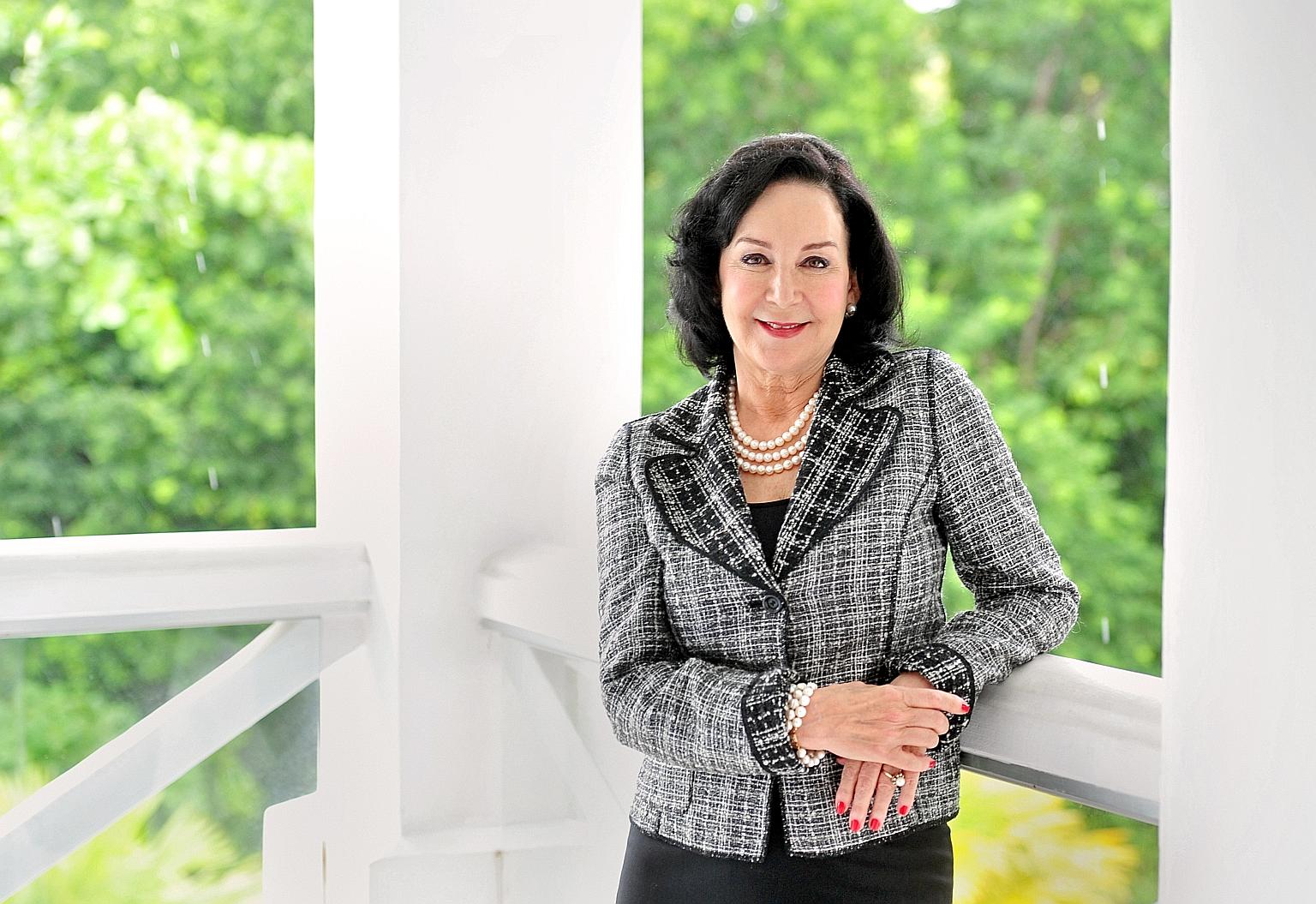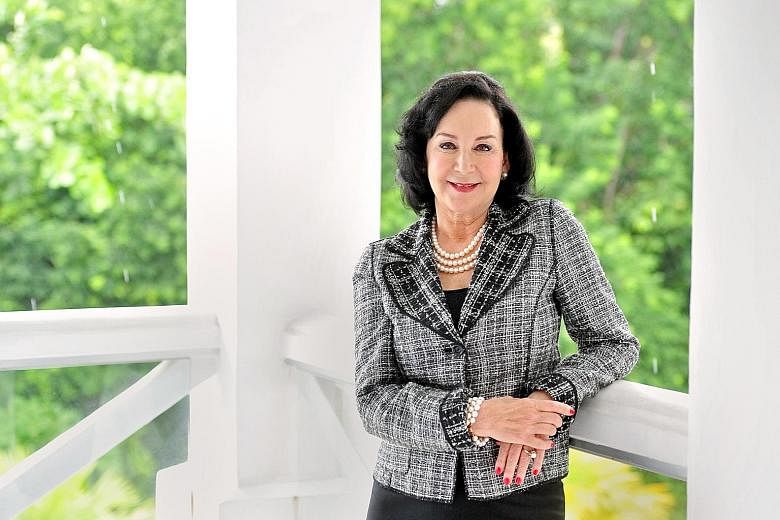Investor Mary Buffett has been eyeing Thailand's Mama Noodles for some time but has managed to resist the urge to splurge.
While Ms Buffett, a gourmand, happily gives in to the temptation to slurp down a packet or two, the value investor in her resolutely keeps herself from buying its shares.
"The share price is always too high," says Ms Buffett, 64, former daughter-in-law of legendary investor Warren Buffett.
"It's like how Warren loved Dairy Queen when he was 12 but had to wait 60 years for the price to be right," she told The Sunday Times on a recent visit to Singapore.
This same patience has tempered her interest in Asian companies as she becomes more involved in the region.

-
Worst and best bets
-
Q What has been your biggest investing mistake?
A Being too cautious, not buying something when it was cheap and then regretting and buying it at a higher price.
When I sold my Apple shares, I knew I should have bought again when they got to a nice low price. I even put in a buy order at US$49 in 2013 because I thought the price would go down further but it only fell to US$55 before going up. It cost me a little bit more but I bought in again in the end.
Q And what has been your best investment move?
A In the early 1990s, a friend of mine and I were thinking of buying a lot of Berkshire Hathaway Class A stocks and then holding and selling them in pieces. I believe word got back to Warren Buffett and that's when he opened the Class B shares at US$1,000 a share. I bought about US$40,000 worth but I should've bought a lot more. The shares split so they're worth a lot more now. It was a great buy.
In the past year, she has given talks in China, Singapore and Vietnam on investment and entrepreneurship, and partnered with local investing education firms.
"I'm lucky to be able to teach and educate people. I think financial literacy is very important. I'm proud to be a representative of the Buffett name so I try to govern my actions accordingly. I strongly identify with what Warren has done in terms of his philanthropy," she says.
Ms Buffett, who separated from Mr Peter Buffett in 1993, has twin daughters and a son.
Q Moneywise, what were your growing-up years like?
A As a kid, I grew up in a typical middle-class working family. The most important thing was how we supported one another as a group.
My mother was my biggest influencer. She always had a real sense of business.
She felt money was really important because it gave women freedom. I was born at a time when women didn't have equal rights so I understood what she meant.
I started working when I was 14. I was singing, selling and writing songs... it was what I enjoyed.
Q How did you get interested in investing?
A When I married Peter at 27, I didn't know what his father did except that he owned a few companies, like See's Candies and Blue Chip Stamps. But I quickly learnt, when I met him, that he was an investing guy.
Around the 1970s, Warren sold the farm left to him by his father to invest in Berkshire Hathaway. He gave each of his father's grandchildren 600 Class A shares, which were worth US$19 each then.
Peter split his shares with me, so I had 300.
That was a lesson in itself. As I saw the price of the stocks constantly increasing, I started to become interested in what he was buying and what was in this holding company.
For Christmas, he would also give each of us US$10,000 worth of a stock he had recently bought.
Warren showed me that the stock market wasn't just investing - it was buying small pieces of the company; you also had to look at everything as a business.
Before that, I was investing in myself, learning about businesses.
Q Describe your investing strategy.
A I reinvest my dividends, which increases the per share value of what I own over time. Buy and hold is my basic strategy.
However, if I realise some stocks are way overpriced, that might be a time to sell them, take some profit and redeploy the money into another company.
I'd also consider selling if a company's management has changed for the worse.
I manage my children's portfolios, and the strategies differ. When you're younger, from 18 to 25, you can take a little bit more risk and maybe buy stocks that have a little more growth potential.
While these stocks generally carry more risk, as a rule, I'd never be interested in a company with a high debt ratio - anything over five times of debt over its earnings.
That signals the management isn't properly handling the company. It is important to find out why the company is borrowing money.
In choosing stocks, you want the lowest price per earnings you can get. You wouldn't buy Coca Cola at 40 times what it was earning but when Coca Cola came out with New Coke, it went below 12 times its price per earnings, and that's when I bought it. We call this the "bad news phenomena".
I also look for companies that have a brand name. This gives them a durable competitive advantage so consumers will constantly go back to them.
For consumer goods and services, it is important to have a reputable brand name and a consumer monopoly.
For example, everyone was dealing with IBM because they had the most secure computer networking system. That gave IBM a long-term competitive advantage.
To me, once you learn the basics of value investing and start to see the compounding effect on the returns on your investments, any other investment approach would seem like gambling.
Q What's in your portfolio?
A Most of my portfolio is in stocks. My portfolio hasn't changed dramatically over the years.
I am in the process of purchasing a business in the food industry. It's something that I completely believe in and I have watched it for eight years.
Another area that is new for me is renewable energies - wind and solar.
But I don't focus on any particular industries or sectors. I like consumer goods because they are easy to understand and people are always going to buy toilet tissue, for instance.
I get a decent growth from my portfolio, between 15 and 20 per cent every year on average.
At around 40 per cent of my portfolio, my biggest position is Berkshire Hathaway, which is growing at over 20 per cent. Berkshire Hathaway is not just one company - it's a holding company so everything they own, I own too.
I don't invest in ETFs and other asset classes. Options and puts are unfamiliar to me so I stick to straight-value investing and things I really understand.
Q What does money mean to you?
A Money means I have the luxury of choice. It means I am able to provide for my family and friends.
Q What's the most extravagant thing you have done?
A I buy all my own jewellery - that can be quite extravagant. I have three drawers of them.
On a trip to Venice, Peter and I saw this pair of earrings with a ruby and a diamond. I bought them for more than US$30,000. My daughters, Erica and Nicole, are always fighting over them!
I also spend money on food because I love food - eating out is one of my biggest expenses.
Q What are your immediate investment plans?
A I'm always looking for great companies so I'm constantly reading the news and annual reports, keeping an eye on the things I own.
Politics affects economies so it's important to look at that aspect too.
There are many companies in Asia that I would potentially invest in. For example, in Thailand, there's a company called Mama Noodles. Everyone eats their cup noodles but the share price is always too high.
After you identify the company, you need that patience to wait for the right price, but if your portfolio already gives you 15 to 20 per cent in returns, you can afford to be patient.
Q Home is now...
A I live very modestly. I have a small, normal house in a nice neighbourhood. But I'm downsizing again because my son is getting his own place so I'm going to get a two-bedroom house in Los Angeles or Santa Monica.
I also plan to rent a place here in Singapore, since I come here quite often.
Q I drive...
A A Volkswagen Beetle which I paid US$14,000 (S$19,500) for.
In any case, my car, my house and my clothes don't define who I am - what I do with my life does.

